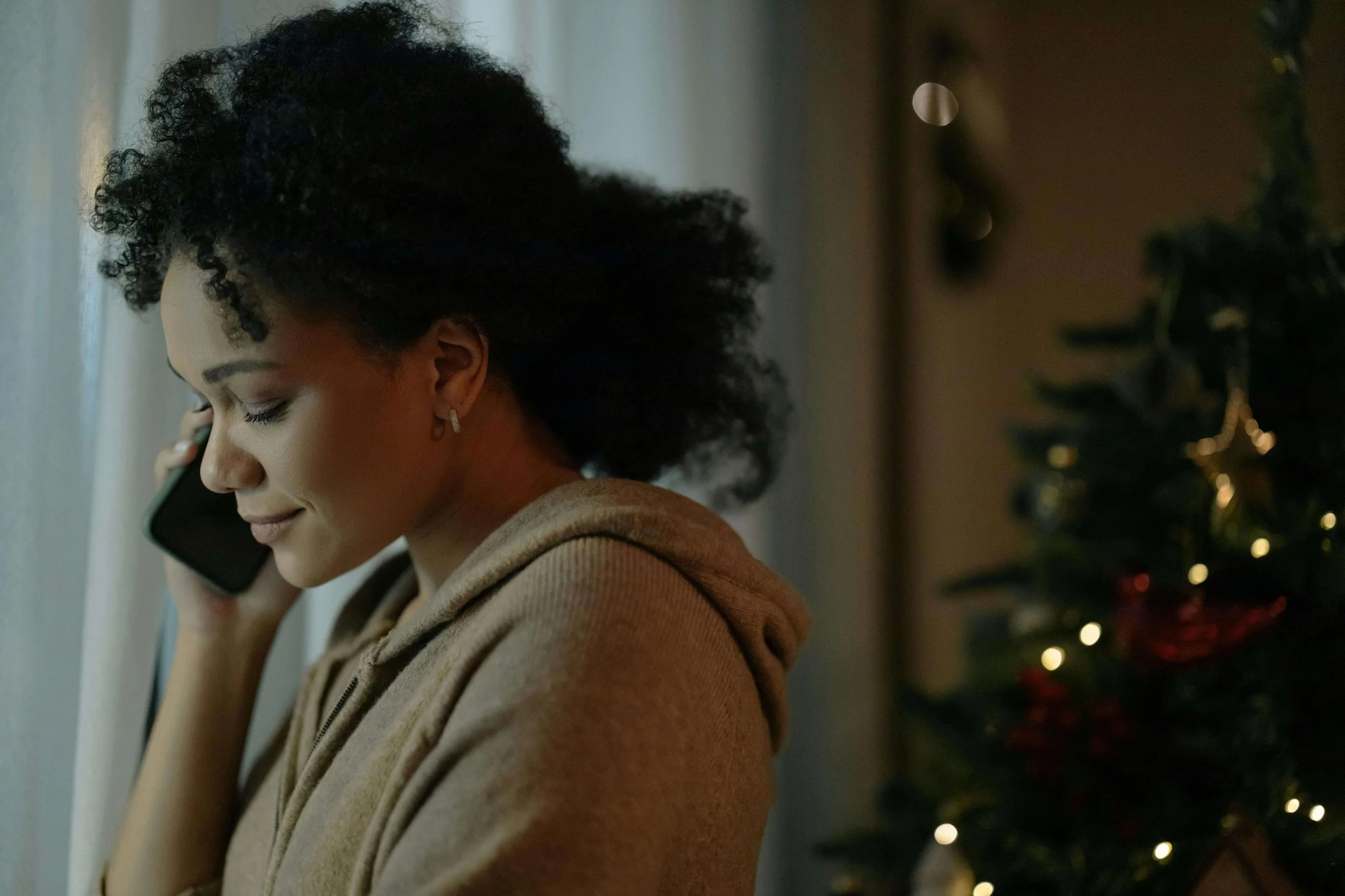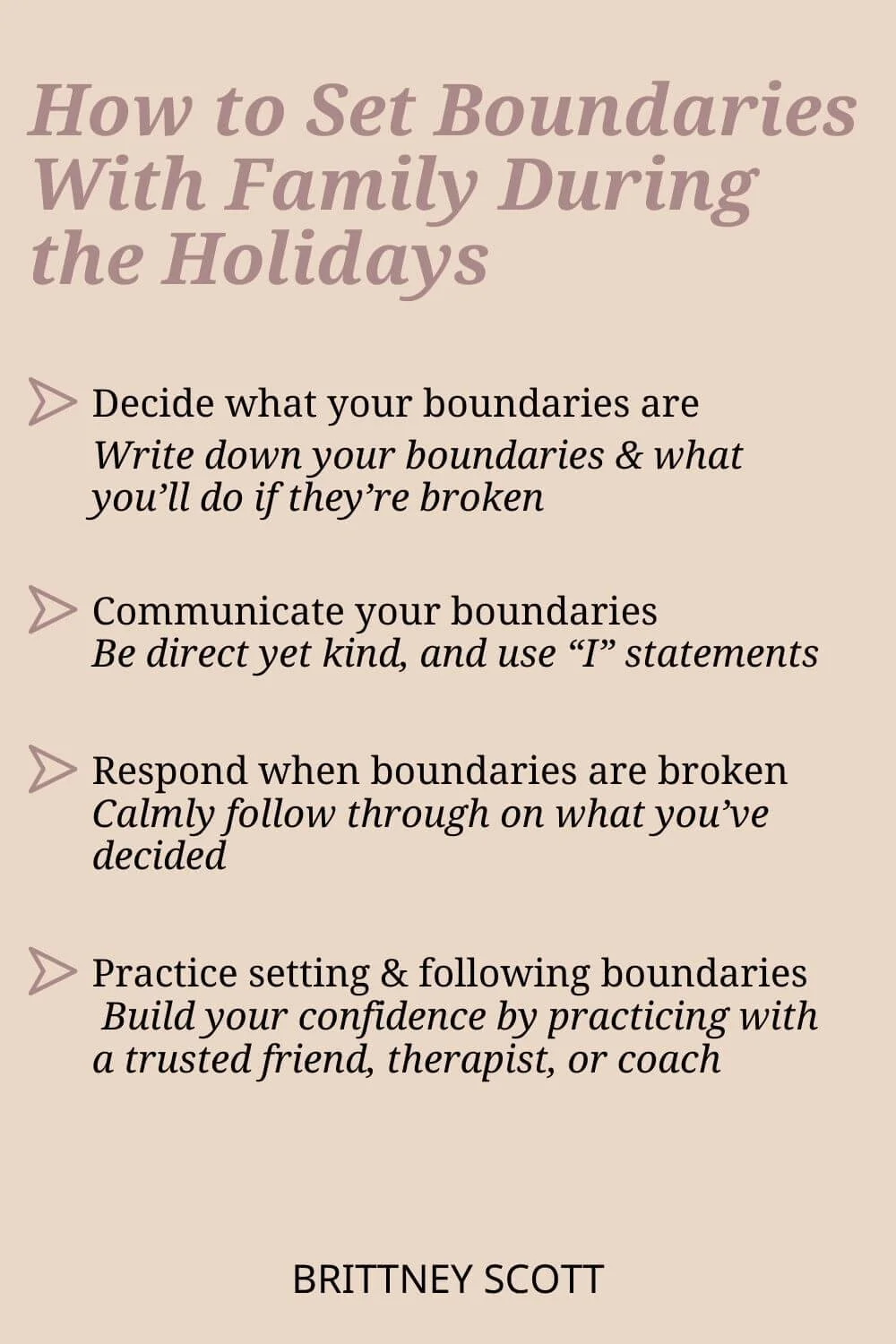Setting Boundaries With Family During the Holidays
While we often think of the holiday as a joyful time, it can also bring stress. Almost half of families report having disagreements during the holiday season. With so many emotions and expectations involved, setting boundaries with family during the holidays can help you protect your peace and maintain healthy relationships.
As a mother–daughter therapist, I see how family patterns and expectations tend to surface this time of year. Whether you’re feeling pressure to keep others happy, healing from a mother wound, or often leave gatherings emotionally drained, boundaries can help you stay grounded and connected.
In this article, we’ll explore what boundaries are, why they matter during the holidays, and how to set boundaries that help you enjoy a more peaceful season.
What are boundaries?
Boundaries are limits you choose for yourself that protect your emotional, mental, and physical well-being. They help you take responsibility for what you allow and how you respond in relationships.
During the holidays, healthy boundaries with family help create space for mutual respect and understanding. This might mean a limit on how long you stay at gatherings, what topics you’ll discuss, or how much you’ll give financially or emotionally.
Why It’s Important to Set Boundaries With Family During the Holidays
Setting boundaries during the holidays helps ease stress and resentment while supporting healthier relationships. They can also help break generational cycles by encouraging honesty and self-respect. Even if others don’t change, boundaries help you care for yourself and respond differently when old patterns appear.
How to Set Boundaries With Family During the Holidays
Setting boundaries with family during the holidays starts with getting clear on what you need and value most, then deciding how you’ll honor those needs when you’re with family.
Decide What Your Boundaries Are
Take time to reflect on what’s worked and what hasn’t during past holidays. Identify what you want to protect this year: your energy, time, or emotional space. Writing your boundaries down and what you’ll do if they’re broken helps you commit to them and communicate them clearly.
Examples of boundaries include:
Limiting time at family gatherings
Not discussing topics that cause conflict
Choosing not to drink or host events
Setting spending limits on gifts
Leaving early if tensions rise
Declining invitations that feel draining
Taking breaks during visits to recharge
Asking loved ones to respect your parenting choices
Communicate Your Boundaries
Communicating boundaries can be difficult, but it’s often key to helping others understand your needs. Depending on your family dynamic, sharing them ahead of time can prevent confusion or hurt feelings.
Be direct yet kind when sharing your boundaries. Use “I” statements, such as “I’m not comfortable discussing politics at dinner” or “I can join for dinner, but I’ll head out afterward to recharge.”
Communication alone won’t always change others’ behavior, and that’s okay. Setting boundaries during the holidays is about being clear on what you’ll do to care for yourself, even if others don’t agree.
Respond When Boundaries Are Broken
Boundaries are about your behavior, not others’. You can’t control how people respond — you can only choose what you’ll accept and how you’ll move.
If a boundary is broken, calmly follow through on what you’ve decided. That might mean ending a conversation, stepping outside for a break, or choosing not to attend future gatherings.
The best choice might be to not go home for the holidays, especially if contact causes emotional harm. Remember that honoring your limits isn’t selfish — it’s self-care.
Practice Setting & Following Boundaries
Like any skill, boundaries take practice. If you’re new to setting them, start small and be patient with yourself. Practice communicating your boundaries and conditions with a trusted friend, therapist, or coach to build confidence before family events.
Each time you follow through, you improve your self-trust and create healthier patterns. Over time, your boundaries will feel more natural, and your relationships will become more respectful.
Setting Boundaries With Family During the Holidays: FAQs
For more on navigating family challenges during the holidays, get answers to common questions below.
Is it normal for families to argue at Christmas?
It’s completely normal for families to argue at Christmas. The holidays add stress, expectations, and financial pressure. In fact, more than 40% of people report increased stress during the season. Different values, family roles, or unresolved issues often resurface, but boundaries can help create more understanding and reduce conflict.
How to set boundaries with family during the holidays?
To set boundaries with your family during the holidays, decide what’s most important to you, communicate those limits clearly, and follow through if they’re crossed. Writing them down can help you stay consistent.
How to deal with toxic family during the holidays?
To deal with toxic family during the holidays, focus on protecting your well-being. Limit contact, avoid topics that trigger conflict, and plan an exit strategy if needed. Setting boundaries with family during the holidays allows you to stay grounded and connected to yourself, even in challenging situations.
Setting Boundaries With Family During the Holidays: Conclusion
Setting boundaries with family during the holidays helps you enjoy the season with less stress and more peace. It’s also an intentional way to care for yourself while improving family dynamics over time.
You don’t have to navigate this alone. Download my free guide to setting healthy boundaries or book a free consultation for personalized support in healing and strengthening your mother–daughter relationship.


